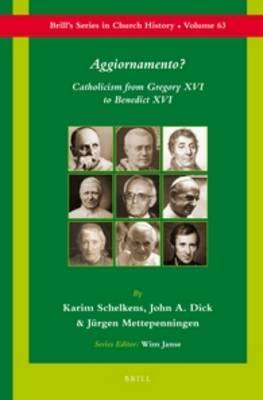Overview
Today many books appear regarding Vatican II. Yet, only very few of them manage to locate this crucial event in the life of the twentieth century Roman Catholic Church against the broad horizon of both its prehistory and its aftermath. This book does just that. In seven chapters, this volume offers a survey of the evolution of Post-Enlightenment Catholicism, in the period spanning from ca. 1830 to the present, tying together the renewals proposed by the first and the Second Vatican Councils. Each phase in this evolution is discussed from a double angle: on the hand from the viewpoint of theological developments and milieu’s, and on the other hand from an institutional and Church historical perspective, thus binding together these two perspectives and tracing the evolutions within Catholicism in all their pluriformity.
Full Product Details
Author: Karim Schelkens ,
John Dick ,
Jürgen Mettepenningen ,
David Schultenover
Publisher: Brill
Imprint: Brill
Volume: 63
Dimensions:
Width: 15.50cm
, Height: 2.00cm
, Length: 23.50cm
Weight: 0.545kg
ISBN: 9789004254107
ISBN 10: 9004254102
Pages: 248
Publication Date: 03 May 2013
Audience:
General/trade
,
General
Format: Hardback
Publisher's Status: Active
Availability: Available To Order

We have confirmation that this item is in stock with the supplier. It will be ordered in for you and dispatched immediately.
Reviews
One of the criticisms often made about church historians is that they ignore the theological issues underlying the facts they are studying. Reading this fascinating book, one is compelled to say that such criticism certainly does not apply here. The book offers a broad and solid synthesis of the evolution of the church and of Catholic theology, from the early nineteenth century up until today. The originality of this volume is precisely that it succeeds to articulate, in seven well-designed and well-documented chapters, the history of the institution as well as the history of its theological reflection. The book introduces us to the great debates that have gone on within Catholic theology since the end of the Enlightenment, showing how these debates have led to the renewal of Catholicism in the last two councils. Along this path, the authors take us into the heart of one the most striking issues of our time, that of the relationship between faith and reason, so highly esteemed by Pope Benedict XVI. Prof. Dr. Philippe Chenaux, Pontifical Lateran University, Rome
This ambitious book combines treatment of the papacy from the reign of Gregory XVI (1831-46) to the election of Francis in 2013 with the significant theological currents of the same period. This is a complex tale clearly told. The authors give attention to each pontificate, and present balanced assessments of the policies pursued.Summing up: Recommended: upper-level undergraduates and above Dr Thomas Izbicki, Rutgers, The State University of New Jersey in CHOICE Magazine, November 2013 One of the criticisms often made about church historians is that they ignore the theological issues underlying the facts they are studying. Reading this fascinating book, one is compelled to say that such criticism certainly does not apply here. The book offers a broad and solid synthesis of the evolution of the church and of Catholic theology, from the early nineteenth century up until today. The originality of this volume is precisely that it succeeds to articulate, in seven well-designed and well-documented chapters, the history of the institution as well as the history of its theological reflection. The book introduces us to the great debates that have gone on within Catholic theology since the end of the Enlightenment, showing how these debates have led to the renewal of Catholicism in the last two councils. Along this path, the authors take us into the heart of one the most striking issues of our time, that of the relationship between faith and reason, so highly esteemed by Pope Benedict XVI. Prof. Dr. Philippe Chenaux, Pontifical Lateran University, Rome
Author Information
Karim Schelkens, Ph.D. (2007) in Theology, Catholic University of Leuven, has studied in Leuven and at the Université Laval, Canada. He is active as Church historian at the universities of Leuven and Tilburg. Schelkens has published extensively on the history of the Second Vatican Council, including an edition of the diaries of Edward Schillebeeckx (Peeters, 2011). John A. Dick, Ph.D. (1986) in Theology, Catholic University of Leuven, postgraduate studies as well at Catholic University of Nijmegen in the Netherlands. Dick is an historical theologian who has focused on Anglican/Roman Catholic relations, secularization, and Religion and Values in U.S. society. Jürgen Mettepenningen, Ph.D. (2008) in Theology, Catholic University of Leuven, is guest lecturer at the theological faculty in Leuven. He published mainly on 'nouvelle théologie', including the book ""Nouvelle Théologie - New Theology: Inheritor of Modernism, Precursor of Vatican II"" (T&T Clark, 2010).




